
The Free Press

The baby blue evening sky was still bright with translucent white clouds when people began showing up to see the stars.
We were on the shore of the Prineville Reservoir in central Oregon, a lovely spot at 3,257 feet surrounded by sagebrush and juniper hills that form a perfect bowl to block out the light from nearby Bend (population 107,305).
“We don’t see these stars in Oregon City,” said Megan Ruljancic, a tall woman in a white sleeveless top who’d driven in from her home in the Portland suburb about 182 miles away.
She was typical of the campers—most of them in flip-flops and shorts—who had sauntered from their campsites in the state park by the reservoir, intrigued by signs posted by rangers advertising an astronomy presentation. It happened to be a weekend when there was a new moon, and the skies were at their darkest.
Two of the rangers, Alexis Ober and Catie Bopp, had set up a table near the waterfront with information on the need for dark skies and the dangers of “sky glow”—the brightness of the night sky caused by artificial light—which pollutes the heavens for 80 percent of the world’s population. Because of sky glow, one-third of the planet cannot see the Milky Way.
Our view of the skies was a given for generations until cities and suburbs started filling up with everything from LED stadium lights to brightly lit skyscrapers. Today, artificial light doesn’t just cast a shadow over the cosmos; it also throws off entire ecosystems, hindering everything from baby sea turtles trying to find the ocean to birds navigating by moonlight.
Proponents of “dark skies” want to give us the ability to gaze up at constellations, stars, and planets with the same vivid clarity that our ancestors once enjoyed.

Since 2001, the Tucson-based DarkSky organization, also known as DarkSky International, has led a movement to create places all over the planet where there’s little to no light pollution. In 2021, the Prineville Reservoir State Park became Oregon’s first state park to get a coveted International Dark Sky Park designation.
“There is the recognition of darkness as a valuable resource,” Ruskin Hartley, CEO of DarkSky, told me last month. “The world is getting brighter. Light pollution is growing by 10 percent a year. The brightening of the night sky is one of the most profound changes to the environment we’ve seen.”
Left unsaid in my discussions with him—and others—is the hard-to-express sentiment that a certain quality of life is at stake when one is unable to see a sky brimming with stars. From the Psalms to the Magi to Shakespearean sonnets, human experience has been intertwined with the firmament for thousands of years. The DarkSky website points out that Vincent van Gogh’s famous The Starry Night was painted in Saint-Rémy-de-Provence, France, in 1889; but today, the Milky Way can no longer be seen from that location (perhaps due to light pollution from nearby Avignon).
Perhaps it was that primal desire to see the natural night sky that drew onlookers to the observatory. Ranger Alexis Ober used a laser to point out the Big and Little Dippers along with the W-shaped Cassiopeia.

Ariel Cody, an 8-year-old from McMinnville, Oregon, was transfixed. “I want to work for NASA and convince an astronaut to explore Saturn,” she said. “I love the stars.”
Meanwhile, Ober was polling the crowd. “Is this the most stars you’ve ever seen?” she asked them.
Most of the people gathered grunted an assent, although there was some conversation about a faint glow to the north.
“The light pollution is from Facebook and Apple,” Ober suggested archly. Facebook has $2 billion worth of data centers in Prineville, a city 16 miles north of us. Apple has a similar footprint.
An Oregon DarkSky spokesperson later told me the most conspicuous sky glow in the area emanates from a regional tire store, not from Big Tech. But the rapid growth of technology companies is exactly why central Oregon has its limits as a world-class stargazing destination. For that, a determined group of Oregon tourism officials, amateur astronomers, and community leaders has picked a different site in the state’s remote southeastern corner.
Set 4,000–6,000 feet above sea level, this arid yet beautiful area about 135 miles south of Prineville is known as the “Oregon Outback” because of its desolate sagebrush steppe and extreme temperatures. The hope is that it’ll become a tourist destination not just for its renowned bicycling routes and bird-watching—the massive Malheur National Wildlife Refuge is smack in the middle of the proposed sanctuary—but also for those wishing to see the skies in their primal beauty.
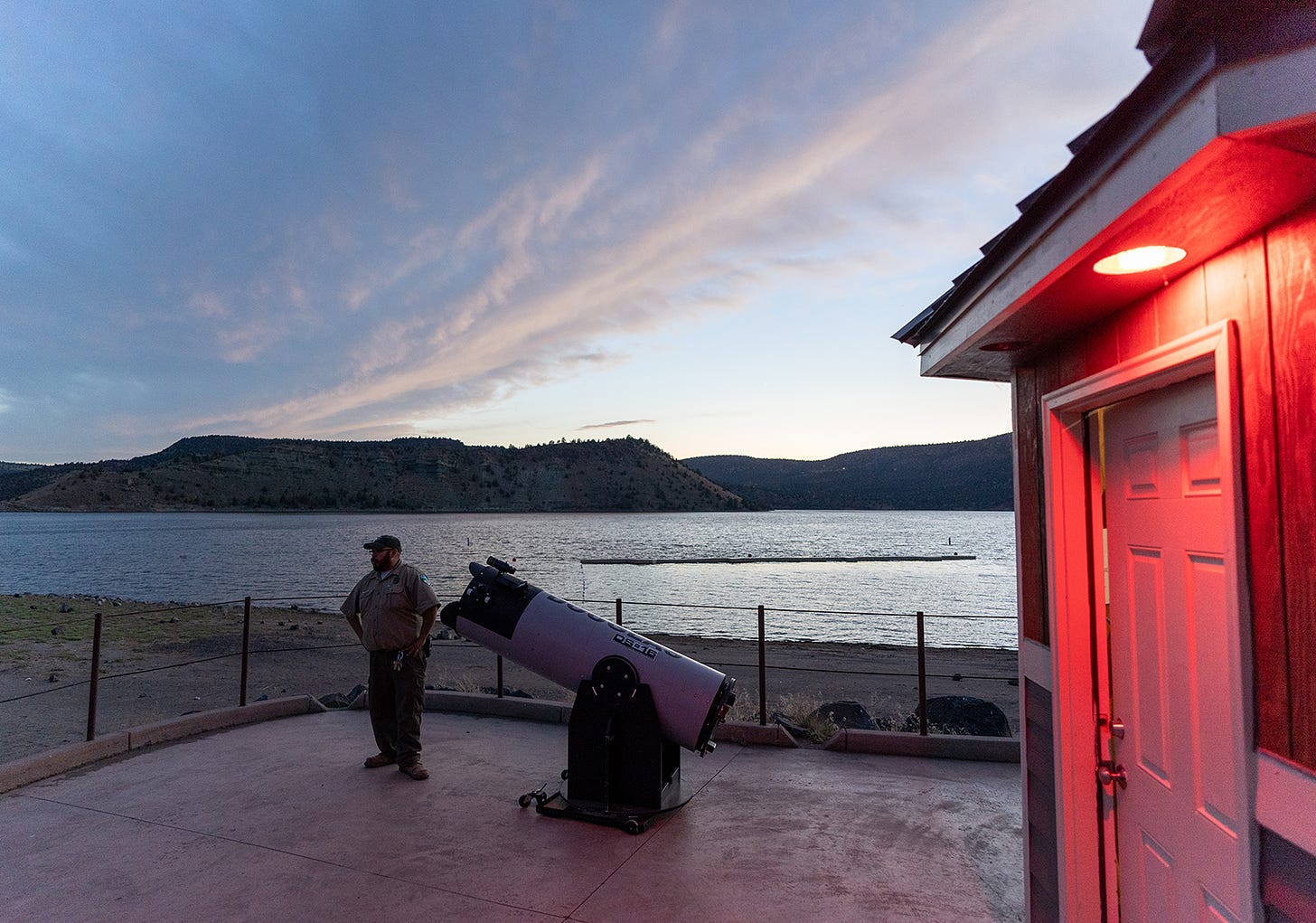
The plans are to link three entire counties—Lake, Harney, and Malheur—to create the world’s largest Dark Sky Park. If DarkSky certifies this region, it would be the size of Denmark—or two New Jerseys—dwarfing all other dark sky sanctuaries around the world.
“These are real commitments,” Hartley said. “You have to have several different public agencies adopt quality lighting policies. It takes years to bring everyone on board.”
As of this past January, there were more than 200 certified Dark Sky Places (ranging from parks to remote sanctuaries) in the world. Currently, the world’s largest such area is the Greater Big Bend International Dark Sky Reserve, which, at 15,000 square miles (9.6 million acres), encompasses parts of Texas and northern Mexico. This year, Hartley tells me, mainland China, Argentina, and Kenya all established their first Dark Sky communities.
The Oregonians are primed to beat those numbers, but first they must get government agencies, seventeen municipalities, and multiple landowners to sign on to a 160-page application and commit to a range of measures, like bringing all outdoor lights into compliance within 10 years.
It took more than two years for the 1,416-square-mile Central Idaho Dark Sky Reserve to be approved in 2017, so it stands to reason that a territory twelve times as large will take a lot longer.
“We are in complex negotiations to make this happen,” Bob Hackett, the executive director of Travel Southern Oregon, told me. “What we are doing is preserving the best dark skies that are left in the lower 48.”
Convincing locals to buy in to the plan is a job that falls to people like Kris Norris, who lives in the tiny Oregon town of Paisley in central Lake County, on the western edge of the proposed sanctuary. Norris oversees Playa, a retreat center for artists and scientists on the shores of Summer Lake, a 20-mile-long body of water just north of town.

Norris, who has long silver hair and black glasses, told me she’s been slowly building trust over the years. She obtained a grant for an astrophotography telescope for local high schoolers to use, and hosts “star parties” where people can gaze through telescopes with guidance from local experts.
“People are proud of what their skies are like here,” Norris said of her fellow residents. “They can’t imagine that the rest of the country doesn’t have that.”
On October 14, a solar eclipse will pass over the western half of the proposed sanctuary. Norris plans to have a star party at Playa that night to get her neighbors thinking of the immense resource sitting over their heads.
“If you move slowly, the people absorb it,” she said. “It’s taken twelve years for the community to really embrace us.”
Just before meeting Norris, I drove into Bend to visit Worthy Brewing, a combo brewery and observatory—possibly the only one in the world—located in a three-story, silo-shaped building with a retractable roof and a 16-inch reflecting Ritchey–Chrêtien telescope.
On a busy summer night, two hundred people will peer through its eyepiece.
Grant Tandy, the observatory’s director, believes it’s more important than ever to fight for dark skies.
“Understanding the night sky and having an appreciation for it was life and death for our ancestors,” he told me. “Understanding when to plant crops, knowing the seasons.
“These days, we barely know of anything beyond the parking lot.”
This is Julia Duin’s first piece for The Free Press. She is Newsweek’s former religion writer, and you can follow her on Twitter @juliaduin.
And to support more of our work, become a Free Press subscriber today:
Also: We’re hosting our first live debate on September 13 at the Ace Theatre in Los Angeles! Has the sexual revolution failed? Come argue about it and have a drink. We can’t wait to meet you in person. You can purchase tickets now at thefp.com/debates.


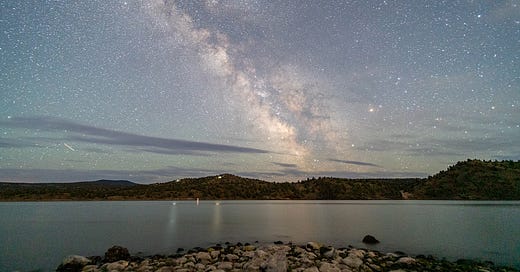



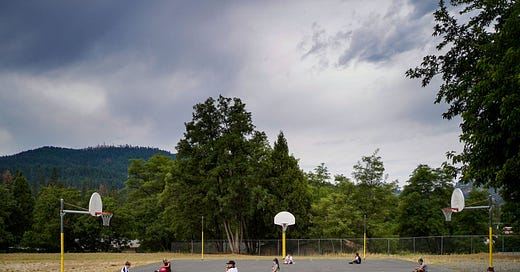



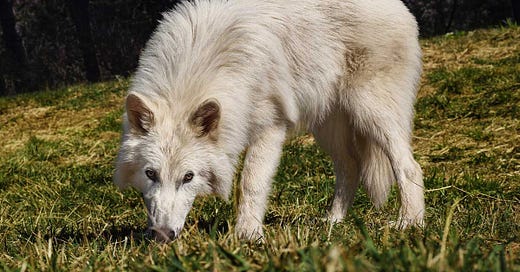


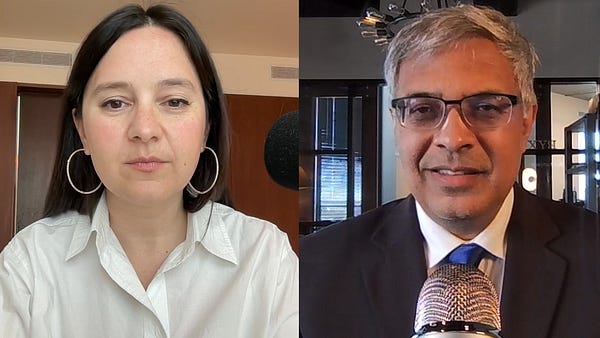

https://www.bigbenddarkskyreserve.org/#:~:text=Spanning%20over%2015%2C000%20square%20miles,Certified%20place%20in%20the%20world.
https://www.bigbenddarkskyreserve.org/#:~:text=Spanning%20over%2015%2C000%20square%20miles,Certified%20place%20in%20the%20world.